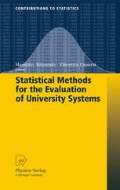Abstract
The surveying of student opinions on teaching activities was introduced as an evaluation tool in Italian Universities in 1999. The aim of the considerable legislative changes put into place by the Ministry of Universities and Scientific and Technological Research, and the procedural efforts carried out by the National Committee for the Evaluation of University Systems (CNVSU), were to set up a procedure for teaching evaluation, where student opinions were to become one of the key parameters used within universities for “decision-making” purposes.
Access this chapter
Tax calculation will be finalised at checkout
Purchases are for personal use only
Notes
- 1.
At the start of the interview: “Do you think that gathering opinions from at-tending students is useful?”
At the end of the interview: “Does the gathering of opinions from attending students involve a considerable economic and organizational effort? Do you think that it is useful to use university resources for this activity?”
- 2.
Kolmogorov-Smirnov test has shown that the two dependent variables distribution does not differ significantly from the normal distribution. Also the residual analysis was applied; it has highlighted no violation of regression model assumptions.
References
Campostrini S, Bernardi L, Slanzi D (2008) Le determinanti della didattica attraverso il parere degli studenti. Franco Angeli, Milano
Gerzeli S, Parise N, Campostrini S, Magni C, Bernardi L (2008) L’impatto della valutazione della didattica sull’organizzazione universitaria: il parere dei presidi. In: Capursi V, Ghellini G (eds) Dottor DIVAGO. Discernere, Valutare e Governare la nuova Università. Franco Angeli, Milano
Goldstein H (2003) Multilevel statistical models, 3rd edn. Edward Arnold, London
Lang J (2001) Improving structural policy under conditions of hybrid governance: multi-actor constellations, integrated feedback instruments and the use of evaluation results. Evaluation 7:7–24
Snijders T, Bosker R (1999) An introduction to basic and advanced multilevel modelling. Sage, London
Yang M, Goldstein H, Browne W, Woodhouse G (2002) Multivariate multilevel analyses of examination results. J R Stat Soc Ser A Stat Soc 165(1):137–153
Author information
Authors and Affiliations
Corresponding author
Editor information
Editors and Affiliations
Rights and permissions
Copyright information
© 2011 Springer-Verlag Berlin Heidelberg
About this paper
Cite this paper
Gerzeli, S. (2011). The Impact of Teaching Evaluation: Factors that Favour Positive Views from Student Representatives. In: Attanasio, M., Capursi, V. (eds) Statistical Methods for the Evaluation of University Systems. Contributions to Statistics. Physica-Verlag HD. https://doi.org/10.1007/978-3-7908-2375-2_6
Download citation
DOI: https://doi.org/10.1007/978-3-7908-2375-2_6
Published:
Publisher Name: Physica-Verlag HD
Print ISBN: 978-3-7908-2374-5
Online ISBN: 978-3-7908-2375-2
eBook Packages: Mathematics and StatisticsMathematics and Statistics (R0)

